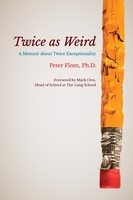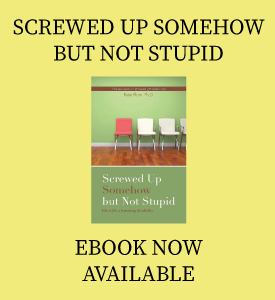I’m sorry. You’re disabled, or your child is. Or grandchild. Or student. I’m disabled too. It sucks.
On the other hand, being me isn’t so bad. And being different from other people, per se, is not so bad either. The world wouldn’t be very interesting if we were all the same, so it’s a good thing we aren’t. People vary. In everything from hair color to intelligence to requirements for sleep.
But this blog is about learning disabilities, which are certainly one form of difference. And celebrating our differences means honoring our disabilities.
But before we get to celebrating we have to get to accepting. Accepting a disability means that we realize that the disability is real. It won’t go away. We may figure out ways to cope with it, but learning disabled kids turn into learning disabled adults. We have to learn to deal with being LD just like neurotypical people have to learn to deal with being NT, and, for any of us, that’s a lot to deal with. That’s one reason adolescence is a messy time – we’re all dealing.
How can we love ourselves or love our offspring, without accepting ourselves? We would then be loving some false version of ourselves or our others. We all know that you can love someone without loving everything they do; but we seem to forget this sometimes in our rush to fix things. This doesn’t mean saying that there is nothing wrong, that there is nothing broken. It simply means that not everything that is broken needs to be fixed.
I cannot celebrate my disabilities. To me, that seems perverse. Thomas Edison supposedly once said he was glad he was deaf because he didn’t really want to listen to anyone. But other than that sort of attitude, I think disabilities are not to be celebrated. But they are to be honored. Our disabilities are a part of us. Sometimes people ask me whether, if it were possible, I would get rid of my disability. If it would change nothing else about me – sure! Absolutely! To say “no” to that seems to me like refusing to wear glasses to correct my nearsightedness. But I don’t see any way that it is even logically possible to eliminate my disability without changing anything else about me. How I think is fundamental to being me, and how I think is fundamentally affected by my being LD. But I can honor my disability. For example, I can admit that I will never be able to draw. Many highly talented people have tried to teach me. It doesn’t work. That is not something my brain can learn. That is a way of honoring my disability.
Once we do that, we can then work on celebrating our differences. A couple years ago I saw a poem on a NYC subway poster; it had won some prize in the elementary schools:
The races of the world
Are like the colors of a rainbow.
Would a rainbow of one color
Be beautiful?
I think a similar attitude can be had with regard to all our many ways of learning (and not learning). We can celebrate our differences, because, indeed, a one-color rainbow would not be beautiful. But we can only celebrate our differences those differences that are once we accept and honor our disabilities.



Well said, Peter. Thank you.